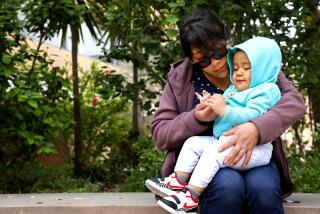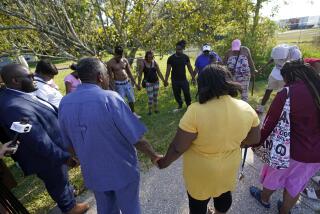Trayvon Martin case: George Zimmerman, mystery gunman
George Zimmerman, who shot a black teenager in Florida, is in hiding after receiving death threats. A full portrait has yet to emerge of the 28-year-old, one of the characters at the center of the drama that has turned questions about race and guns into a national debate.
Since the fateful rainy night of Feb. 26 when Zimmerman, on patrol as a neighborhood watch volunteer, crossed paths in Sanford, Fla., with an unarmed Trayvon Martin, 17, the older man has been the subject of speculation. His friends and family have tried to defend him, have given a few interviews. But it has been the media -– principally, the Orlando Sentinel –- that has to fill in the outlines of the life of Zimmerman, variously described as white or a Latino.
Zimmerman’s family has denied that race played a role. “The portrayal of George Zimmerman in the media, as well as the series of events that led to the tragic shooting, are false and extremely misleading,” wrote his father, Robert, a retired magistrate judge, in a letter published in the Orlando Sentinel. “Unfortunately, some individuals and organizations have used this tragedy to further their own causes and agendas.”
“George is a Spanish-speaking minority with many black family members and friends,” the elder Zimmerman said. “He would be the last to discriminate for any reason whatsoever.”
Zimmerman, the third of four children, grew up in Manassas, Va. where he lived in the 1980s and 1990s with his white father, Latina mother, siblings and a grandmother. The family was “very Catholic ... very religious,” neighbor Jim Rudzenski told the Washington Post. The children attended All Saints Catholic School through eighth grade before going to Osbourn High School. George was an altar boy and evening receptionist at the church.
Zimmerman joined a Future Business Leaders of America club, according to the Post. In his senior yearbook, he wrote: “I’m going to Florida to work with my godfather who just bought a $1 million business.”
All was not easy in Virginia. In high school, Zimmerman was the victim of a minor criminal assault, Manassas police Sgt. Eddie Rivera told the newspaper. No other details were available.
Around a decade ago, Zimmerman moved to Florida with his parents, who bought a home in a Lake Mary subdivision, according to the Sentinel. The younger Zimmerman was initially listed on the deed and records indicate he lived there for several years. In 2003, he enrolled in Seminole State College, working toward a vocational certificate to become an insurance agent.
But things soured.
In July 2005, Zimmerman, then 21, was at a bar near the University of Central Florida when a friend was arrested by state alcohol agents on suspicion of serving underage drinkers, according to an arrest report in the Sentinel. Zimmerman became profane and pushed away an agent who tried to escort him, the report said. Authorities said he was arrested after a short struggle. Charged with resisting arrest without violence, he avoided conviction by entering a pretrial-diversion program, something common for first-time offenders.
A month later, an ex-fiancée filed a petition for an injunction against Zimmerman, citing domestic violence. Zimmerman responded by filing a petition of his own the following day. The fight led to protective injunctions that expired Aug. 24, 2006.
Zimmerman married Shellie Nicole Dean, a licensed cosmetologist, in late 2007.
The next year, he resurfaced in court documents as a credit-card company pursued him. Capital One accused Zimmerman of failing to pay more than $1,000. He settled with the company for $2,135.82, records show, to cover his debts with interest, as well as attorney and court costs.
The credit card company soon reported that Zimmerman wasn’t making the agreed payments. Zimmerman’s employer at the time, CarMax, agreed to garnish his wages. That arrangement was canceled in late 2008 because Zimmerman was no longer working there.
In 2008, Zimmerman attended a four-month law-enforcement program given by the sheriff’s office, Kim Cannaday, spokeswoman for the Seminole County sheriff’s office, told the Sentinel. In his application for the course, Zimmerman wrote: “I hold law enforcement officers in the highest regard and I hope to one day become one.”
It’s unknown what was Zimmerman’s job on Feb. 26, but what is known is that he took policing very seriously. He reenrolled in Seminole State College with the goal of becoming a cop in 2009 and was working toward an associate degree. Zimmerman last week was dropped by the school which said it acted because of safety issues for Zimmerman and other students.
For at least eight years, Zimmerman seems to have been part of a neighborhood watch group, based in his Retreat at Twin Lakes community. During that time he called the police department at least 46 times with reports of various sightings such as open garages and suspicious people, often African American, it was reported.
It was such a call that police released last week. Zimmerman told the 911 operator that he saw a suspicious teenager.
“Something’s wrong with him. Yep. He’s coming to check me out,” Zimmerman told a police dispatcher in a 911 call released Monday. “He’s got something in his hands. I don’t know what his deal is. Send officers over here.”
The teen started to run, Zimmerman reported. When Zimmerman said he was following, the dispatcher told him, “We don’t need you to do that.”
Shortly afterward, neighbors began calling 911 to report a fight, then a gunshot. By the time police arrived, Trayvon Martin was dead.
RELATED:
Obama weighs in on Trayvon Martin case
‘Blacks are under attack,’ says Jesse Jackson
Banks: Anger over Trayvon Martin’s slaying transcends the issue of race
More to Read
Sign up for Essential California
The most important California stories and recommendations in your inbox every morning.
You may occasionally receive promotional content from the Los Angeles Times.











